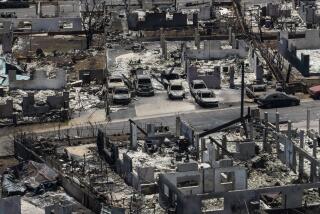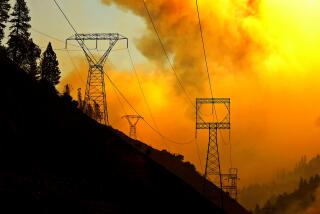Ohio Utility Denies Fault in Blackout
- Share via
WASHINGTON — The chief executive of an Ohio utility whose lines were among the first to fail in the Northeast blackout told Congress Thursday that “many small chance events” led to the power outage, which, he contended, should not be blamed on problems at his own company, FirstEnergy Corp.
H. Peter Burg, chairman of the Akron-based company that has figured prominently in early theories of the blackout, said the event was caused by “the cumulative effect of occurrences in the region” and compared the failed power grid to a boxer collapsing after many blows.
The testimony came on the second day of House hearings into the Aug. 14 power failure that, in a period of nine seconds, spread across parts of eight states and Canada.
A federal investigation continues, and Energy Secretary Spencer Abraham has said that a definitive explanation is weeks away.
Thursday’s hearing before the House Energy and Commerce Committee highlighted failures of communication in which many electricity operators were caught off guard, even though parts of the Northeast grid were experiencing a series of problems before the blackout. House and Senate negotiators begin work today on energy legislation that includes measures designed to strengthen the grid.
In his testimony, E. Linn Draper, chairman of American Electric Power in Columbus, Ohio, said, “We were not aware that the system was in peril of collapsing until the time it did.”
But the main focus was on the role played by FirstEnergy, which, almost from the start, has figured at the center of speculation about the cause of the blackout. The firm, which owns or co-owns four of the first five power lines to fail on Aug. 14, has had other problems in recent years.
It was criticized in 2002 by the Nuclear Regulatory Commission for insufficient maintenance of a nuclear plant. The Environmental Protection Agency sued it for clean-air violations in 1999.
Shortly before the blackout, FirstEnergy announced plans to restate earnings downward due to problems in its past accounting procedures.
“There’s a pattern here at FirstEnergy. It’s a pattern of cutting corners and neglect, and it has devastating consequences” for consumers in Ohio and beyond, said Rep. Edward J. Markey (D-Mass.).
Rep. Jim Greenwood (R-Pa.) questioned whether computers in the FirstEnergy control room were providing an accurate picture of developing problems.
“They were receiving phone calls from the field saying, ‘We’ve got a problem,’ and these guys were not seeing it on their computer,” Greenwood said. “What may have happened is that the system was collapsing around them, and they were flying blind.”
But Burg, while acknowledging that the company was looking into problems with its computer system, insisted that FirstEnergy should not be blamed for the power outage, which put about 50 million people in the dark, some for several days.
“The widespread loss of power could only result from a combination of events,” Burg told lawmakers. He asserted that it was “not possible for a few isolated events on any individual utility system” to be the cause of such a widespread blackout.
He said that while the utility did experience power failures on Aug. 14 -- one of its power plants shut down at 1:31 p.m., according to a company timeline -- the entire system responded as it should have. “Power systems and flows corrected themselves,” he said.
“Our system was relatively stable until the very end,” Burg said.
Some of the testimony underlined the need for better communication throughout the electrical grid.
Joseph L. Welch, chief executive of International Transmission Co., an independent transmission company in southeast Michigan, said he learned about the blackout when the lights in his office went out.
“This lack of communication left us in a position where there was nothing we could have done to prevent the blackout from affecting our system,” he said, likening the outage to a “tsunami hitting an unsuspecting coastal community.”
On Wednesday, the committee released a transcript of conversations between workers at the FirstEnergy control room near Akron and technicians at the regional grid coordinator in Carmel, Ind., that point to confusion leading up to the blackout.
“Something strange is happening,” Don Hunter, reliability coordinator for the Midwest Independent System Operator, told a FirstEnergy worker.
Told of the failure, a FirstEnergy technician said, “Daggone it. When did that happen?”
“We’ve got some problems going on over here,” another FirstEnergy worker responded a short time later.
Asked by Hunter what was happening, the FirstEnergy representative said: “We have no clue.”
A separate hearing was held Thursday on vulnerabilities of the electric grid to cyber-attack.
“We can be sure that our enemies took notice of the massive social and economic disruption the blackout caused,” said Rep. Christopher Cox (R-Newport Beach), chairman of the Homeland Security Committee.
A Senate hearing on the blackout is planned for Wednesday.
More to Read
Inside the business of entertainment
The Wide Shot brings you news, analysis and insights on everything from streaming wars to production — and what it all means for the future.
You may occasionally receive promotional content from the Los Angeles Times.











